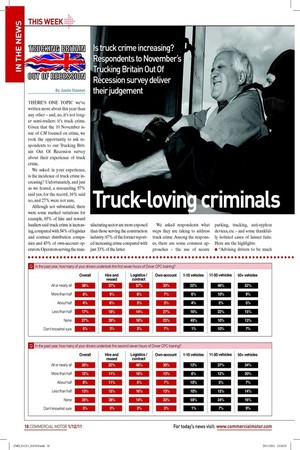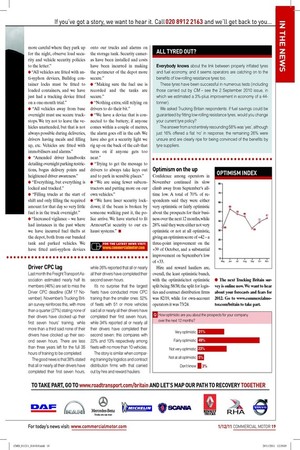Truck-loving criminals
Page 11

Page 12

If you've noticed an error in this article please click here to report it so we can fix it.
Is truck crime increasing? Respondents to November’s Trucking Britain Out Of Recession survey deliver their judgement
By Justin Stanton
THERE’S ONE TOPIC we’ve written more about this year than any other – and, no, it’s not longer semi-trailers: it’s truck crime. Given that the 10 November issue of CM focused on crime, we took the opportunity to ask respondents to our Trucking Britain Out Of Recession survey about their experience of truck crime.
We asked: in your experience, is the incidence of truck crime increasing? Unfortunately, and just as we feared, a resounding 57% said yes; for the record, 16% said no, and 27% were not sure.
Although not substantial, there were some marked variations: for example, 65% of hire and reward hauliers said truck crime is increasing, compared with 54% of logistics and contract distribution companies and 43% of own-account operators. Operators serving the man
ufacturing sector are more exposed than those serving the construction industry: 67% of the former reported increasing crime compared with just 33% of the latter. We asked respondents what steps they are taking to address truck crime. Among the responses, there are some common approaches – the use of secure parking, tracking, anti-syphon devices, etc – and some thankfully isolated cases of laissez faire. Here are the highlights: • “Advising drivers to be much more careful where they park up for the night, observe load security and vehicle security policies to the letter.” • “All vehicles are itted with anti-syphon devices, Bulldog container locks must be itted to loaded containers, and we have just had a tracking device itted on a one-month trial.” • “All vehicles away from base overnight must use secure truckstops. We try not to leave the vehicles unattended, but that is not always possible during deliveries, drivers having meals and illing up, etc. Vehicles are itted with immobilisers and alarms.” • “Amended driver handbooks detailing overnight parking restrictions, bogus delivery points and heightened driver awareness.” • “Everything, but everything is locked and tracked.” • “Filling trucks at the start of shift and only illing the required amount for that day so very little fuel is in the truck overnight.” • “Increased vigilance – we have had instances in the past where we have incurred fuel thefts at the depot, both from our bunded tank and parked vehicles. We have itted anti-syphon devices onto our trucks and alarms on the storage tank. Security cameras have been installed and costs have been incurred in making the perimeter of the depot more secure.” • “Making sure the fuel use is recorded and the tanks are secure.” • “Nothing extra; still relying on drivers to do their bit.” • “We have a device that is connected to the battery; if anyone comes within a couple of metres, the alarm goes off in the cab. We have also got a security light we rig up on the back of the cab that turns on if anyone gets too near.” • “Trying to get the message to drivers to always take keys out and to park in sensible places.” • “We are using fewer subcontractors and putting more on our own vehicles.”
• “We have laser security lockdown; if the beam is broken by someone walking past it, the police arrive. We have started to it ArmourCat security to our exhaust systems.” ■











































